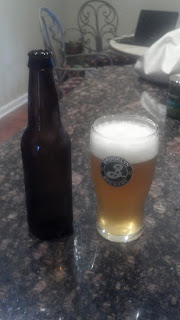Ingredients:
5 lbs. 2-Row Pale Malt
4 lbs. White Wheat Malt
8 oz. Cara-Pils/Dextrine
8 oz. CaraVienne
8 oz. Rice Hulls (to help establish the grain bed since
wheat tends to be more sticky that 2-Row, etc.)
1 oz. Sterling Hops (45 minute boil)
1 oz. Palisade Hops (last 2 minutes of boil)
1/2 tsp. Yeast Nutrient
1 tablespoon 5.2
pH mash stabilizer
1 pkg. American Wheat Yeast (Wyeast Labs #1010)
5 oz. Corn Sugar or approximately 2/3 cup
9 gallons of drinking water (added .5 gallon to
compensate for the added rice hulls)
Process:
- Clean and sanitize all equipment that will come in contact with your beer.
- Prepare your strike water by heating 13 quarts of water or 3.25 gallons (1.25 quarts of water per pound of grain) to a temperature of 162-170 degrees. I heated the water to 169 degrees and this seemed to hit the target for mashing.
- Add about 4 quarts of your strike water to the mash tun to heat it up and begin adding your crushed grains and the remaining strike water. Stir thoroughly to avoid dry pockets (dough balls).
- Once the mixture is thoroughly combined check the temperature to ensure it is approximately 152-154 degrees. If not, adjust by adding hot or cold water. Mash temp maintained about 153 degree throughout the hour.
- Once your mash is at the proper temperature add pH stabilizer and close the mash tun and let steep for 60 minutes.
- Prepare your sparge water by heating 5 gallons of water to a temperature of 170 degrees.
- Optional - check for starch conversion by performing an iodine test or simply taste the mixture. If conversion has taken place the mixture will taste sweet.
- Perform vorlauf by slowly collecting the first runnings of your wort and adding them back to mash tun. Take care to not let grain bed collapse by draining too quickly or dumping first runnings back in the mash tun with too much force. Repeat this step 2-5 times until the runnings are free of debris and running relatively clear.
- Collect your first runnings into your brew pot by allowing all of the wort in your mash tun to slowly drain out. Take your time and be careful to not let your grain bed collapse.
- After your mash tun has drained close the valve and add all of your sparge water to the tun and stir. Do not worry about disturbing the grain be as you are going to create a whole new grain bed for the second runnings.
- Repeat Step 9 above (vorlauf) and collect enough wort until you have about 6.5 - 7 gallons of beer or a measured pre-boil specific gravity of 1.048.
- Return your brew kettle to burner and bring wort to a vigorous boil.
- As soon as the beer begins to boil add 1 oz. of Sterling hops for bittering and boil for 45 minutes.
- Add the wort chiller to the boil during the last 15 minutes to sterilize.
- During last 10 minutes of boil add 1/2 tsp. of yeast nutrient dissolved in small amount of warm water.
- With 2 minutes left in the boil add 1 oz. of remaining Palisade hops.
- Terminate boil and chill to fermentation temperature of approximately 70 degrees.
- Take a specific gravity reading and record. Target SG is approximately 1.048 (according to BrewSmith software).
- Estimated post-boil volume is 5.98 gallons. Optional - add water to achieve target SG. Ended up with less than 5 gallons in carboy after boil. Should have been more but still seemed to hit target OG. Not sure what, if any, affect this will have on the finished product.
- Transfer to fermentation carboy. I strained this batch to reduce trub. Make sure you have the volume you are aiming for and if it is off then consider adding top-off water.
- Pitch yeast and aerate well using pure oxygen.
- Attach blow-off tube and ferment until complete according to hydrometer readings.
- Optional - Transfer to secondary fermentation carboy for clarifying.
- Prepare priming sugar by boiling 2 cups of drinking water and add 5 oz. (approximately 2/3 cup) of priming sugar. Be careful not to scorch. Boil for 5 minutes and add to bottling bucket. Add wort, stir gently for 1 minute and bottle. My last batch was over-carbonated so I am reducing the amount of sugar in this step to approximately 4 oz.

- Brew Day - March 10, 2013
- Kegging Day - April 9, 2013 (30 days in Primary, no Secondary)
- OG - 1.050
- FG - 1.012
- ABV - 5%
- Notes:
- Fermentation on this batch went CRAZY! It was a good thing I attached a blow-off tube since so much of the krausen overflowed into the water-filled growler. After pitching the yeast I shook the carboy for about 1 minute and then infused pure oxygen for 30 seconds.
- I am going to keg this batch. It will be my first kegging attempt.
The Verdict:
- The keg didn't last long at the party so I'd say it was a success.






